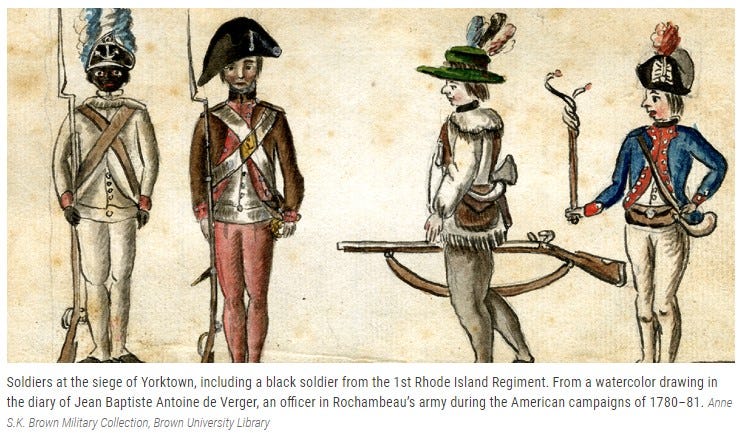Confederate "Heritage" Month, April 16: James Oakes on the 1619 Project (3) - Military emancipation in the American Revolution
More on early anti-slavery in the US
We’ve looked at some of the arguments of James Oakes made in 20211 about The 1619 Project2. One of his main concerns was that the presentations obscures important complexities about pro-slavery and anti-slavery politics.
He addresses the Dunmore Proclamation of 17753 by the British colonial governor of Virginia that offered freedom to any slaves that would join the British forces against the rising armed rebellion we now know as the American Revolution.
Consider the famous incident in late 1775 when a British official, Lord Dunmore, offered emancipation to slaves in Virginia who joined his troops. [New York Times editor Jake] Silverstein [in his defense of The 1619 Project4] tried to argue that Dunmore’s famous proclamation so angered the colonists that it tipped them into rebellion. Scholars quickly pointed out that Dunmore was responding to a colonial rebellion that was already well underway. Yet Dunmore’s proclamation is significant for reasons that escape Silverstein. The fact that so many enslaved people took up British offers of emancipation is significant in its own right, but the fact that the British even made the offers revealed a historic shift in the relationship between slavery and war.
Throughout history, war has been the largest single source of slaves. War has generally led to mass enslavement, not mass emancipation. But enlightened theories of war were biased against slavery, and that bias was reflected not only in British policy but in the Americans’ acceptance of that policy. In three separate treaties with Great Britain — in 1783, in 1795, and in 1815 — the Americans accepted that slaves who escaped to British lines and were emancipated during the war would not be returned to their owners, nor would their owners be compensated. Slaves were legally defined as personal property, and both the Confederation Congress and the first US Congress affirmed that personal property could be legally confiscated in “just” and “lawful” wars. Thus, the American Revolution established the legal principle that military emancipation was a legitimate practice under the laws of war, thereby setting the crucial precedent for military emancipation during the Civil War. [my emphasis]
Yes, that was a contradictory aspect of the American Revolution, which did not aim at ending slavery in the new nation. And that is part of Oakes’ point. The Revolution was not about abolishing slavery. But it did have a combination of pro-slavery and anti-slavery aspects. And so did the politics of the United States in the following decades.
Oakes stresses further:
The rise of Anglo-American slavery gave rise to Anglo-American antislavery. But it was the revolution itself that put slavery in jeopardy. It was the revolution that injected anti-racism into American political culture, as a counterpoint to the increasingly racist defense of slavery. And it was the revolution that inspired the world’s first abolitionist movement, the world’s first provision for the abolition of the slave trade, and the world’s first abolition statutes. [my emphasis]
Any portrayal of the American Revolution as being primarily a pro-slavery counter-revolution against impeding British abolition of slavery is just not tenable.
And it’s always important to keep in mind that improvements in agricultural and the new technology of the cotton gin in the 1790s gave slavery in the US a vastly expanded potential for profit. The institution of slavery itself changed - much for the worse from the freedom standpoint - and the ideology of white racism itself developed into a more intense version as the institution of slavery become more valuable for slaveowners.
Black patriot soldiers fighting for the American Revolution5:
Oakes, James (2021): What the 1619 Project Got Wrong. Catalyst 5:3, 6-47.
Hannah-Jones, Nikole, et. al. (2019): Introduction. In: The 1619 Project, New York Times Magazine 08/18/2019.
Miller, Bruce (2023): The Dunmore Proclamation and Black Americans in the American Revolution. Contradicciones 04/07/2023. <https://brucemillerca.substack.com/p/confederate-heritage-month-2023-april-a59>
Silverstein, Jake (2019): Why We Published the 1619 Project. New York Times Magazine 12/20/2019. <https://www.nytimes.com/interactive/2019/12/20/magazine/1619-intro.html> (Accessed: 2023-07-04).
Source: 10 Facts: Black Patriots in the American Revolution. <https://www.battlefields.org/learn/articles/10-facts-black-patriots-american-revolution> (Accessed: 2023-08-04).


